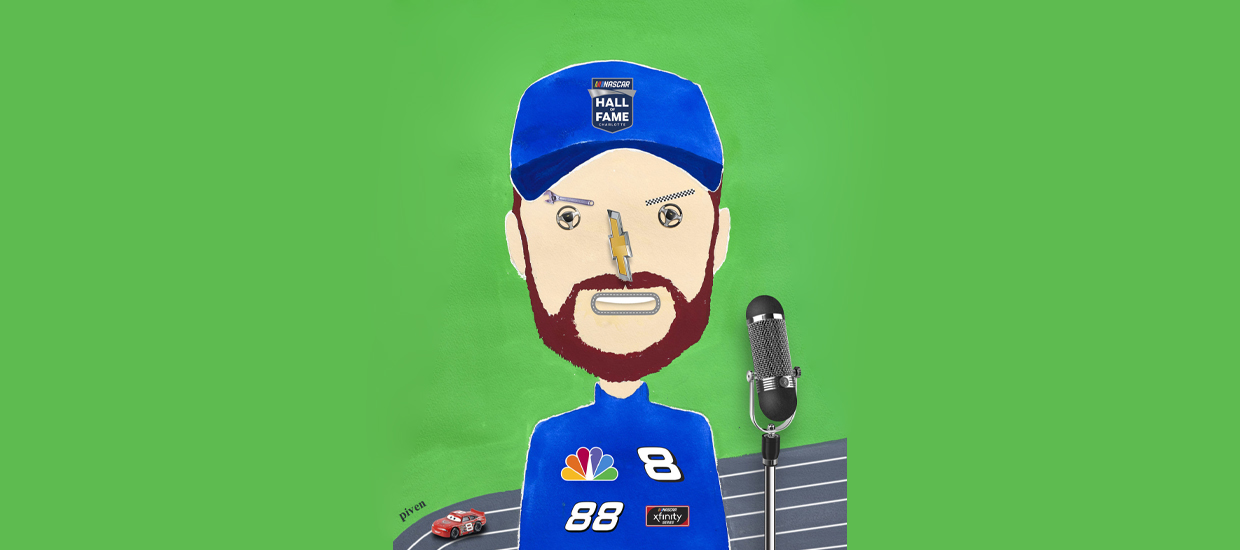Most men of unmistakable talent set out to make a name for themselves. Dale Earnhardt Jr., however, had already seen his name in lights, thanks to his namesake father, one of the greatest drivers in NASCAR history. But when the younger Earnhardt followed his dad into racing, he showed that he was also a force to be reckoned with. Junior may not have surpassed Senior’s accomplishments on the trackhe won 26 NASCAR Cup races during his career, while “the Intimidator” took the checkered flag 76 times before dying, at age 49, in a crash on the final lap of the 2001 Daytona 500—but he did eclipse his progenitor in an unexpected way. With his good looks and media-friendly personality, Dale Earnhardt Jr. saw his popularity extend far beyond NASCAR’s usual Southern environs. He appeared in the pages of Rolling Stone and on the stage at the MTV Video Music Awards. He started a popular podcast, The Dale Jr. Download. Fans voted him their favorite driver 15 years in a row.
Dale Earnhardt Jr. retired from driving full-time in 2017, and this June saw the culmination of the 45-year-old’s on- and off-track career, as he was voted into the NASCAR Hall of Fame, where he’ll join his dad, who was inducted posthumously in 2010. On top of that, in July, the brand-new NBC streaming service Peacock released Lost Speedways, a show that follows Dale Earnhardt Jr. as he investigates abandoned racetracks, showing off the intellectual curiosity and innate likability that have made him an icon. Dale Earnhardt Jr. called Hemispheres from his home in Mooresville, North Carolina, the day after receiving the news of his Hall of Fame induction (and just a few minutes after putting his 2-year-old daughter, Isla, down for a nap) to talk about that honor, his new show, NASCAR’s response to Black Lives Matter, and more.
First things first: Congratulations on making it into the NASCAR Hall of Fame! Where were you when you got the news?
I do a podcast weekly, and we decided to actually do the podcast while the announcement was being made. The tricky part with that is you might not get picked. I had my wife there, and my daughter and my sister, and a lot of people that are close to me were in the building, and if you don’t get picked, it’s gonna be kinda awkward. And so that’s how we found out, in a live moment. The podcast is also a TV show that’s on NBC Sports Network, so we were able to capture it on camera. Years down the road, that video will be great to show my girls and their families.
How did it feel when you heard your name called?
It’s almost like it can’t be real. You don’t really have this career-flash-before-youreyes moment, but you definitely think back and have a sense that all of it was worth it. My career was very good, but there were a lot of low points and struggles. I wasn’t as successful as my dad: He won seven championships and all these races, and as I was getting into my career, I thought, “Well, I’m not gonna be able to live up to his career.” People wanted me to emulate him so badly. And I realized that I wasn’t going to be able to do that, so I thought, “How can I make an impact on the sport in other ways? ” So I focused on trying to be an ambassador for the sport.
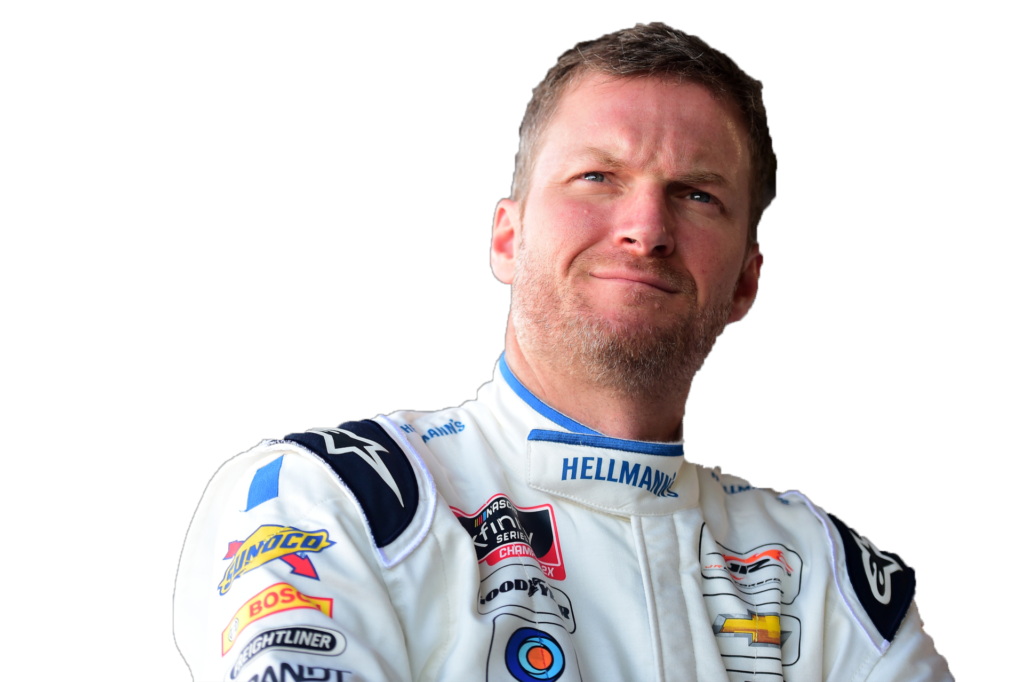
Budweiser, my sponsor in the first half of my career, had a lot of leverage to get me into places that typically NASCAR drivers weren’t getting into: Rolling Stone, or introducing a band at the MTV Awards. It was terrifying. But I would be standing in front of people that never thought to watch a race, didn’t know much about NASCAR, and turning them into new race fans. That’s one of the things I’m most proud about my career. While I’m going through this Hall of Fame thing, I’m seeing a lot of messages from fans that say they started watching NASCAR because of me, and that’s such a great compliment.
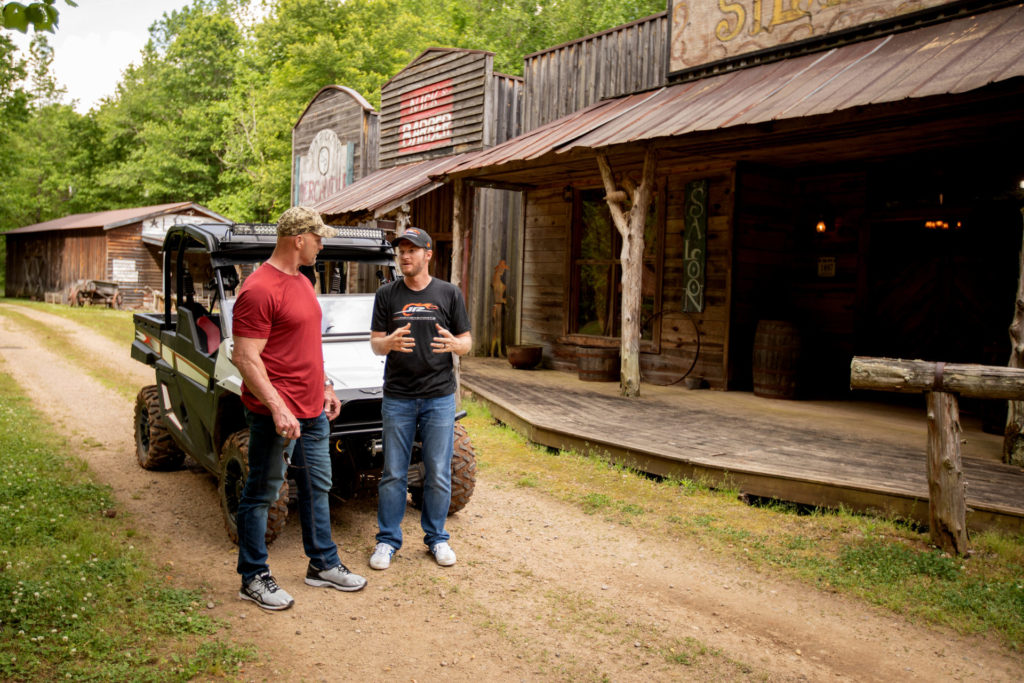
What do you think your dad would have said about the Hall of Fame announcement?
I have to imagine it would have been a great moment for him. When I was a little boy, my parents divorced, and I didn’t have a really incredible relationship with my dad. He was very career-driven and didn’t have very good father skills. I really yearned for his appreciation, and I really yearned to make him proud, or get any kind of reaction out of him. When I got older and started driving, and I was winning and doing well, the affirmation that I got from him and the hugs in victory lane—those were some of the first real hugs that we ever had. I was having this incredible relationship really blasting into existence with him, just blossoming very quickly in a period of two or three years. And then he was gone. And so I imagine that if I got into the Hall of Fame and he were here, he would probably be telling me things that I never heard him say.
That must be bittersweet.
Oh, absolutely. I think about him a lot. Any time I’m going through anything personal or going through a challenging time in my life, you always really wish you had their advice—even if you didn’t agree with it or follow it, you could at least use that advice in your favor somehow. He didn’t finish high school, but he had a really, really great business mind, and he won on common sense. He just always did the right thing and always treated people the right way and made the right decisions.
In the first episode of your new show, Lost Speedways, you dig into some family history, to try to figure out if your dad ever raced with your grandpa. What did you know prior to filming?
There’s a picture of Dad and Ralph [Earnhardt] together, and they’re out on the racetrack. That picture is from a practice, and I’ve been told, whether by family or other people in the motorsports industry that were around at that time, that on that same day they were racing.
We’re talking in the ’70s?
Yeah, ’71, ’72, probably, right before Ralph passed. On that short-track level, you go to the racetrack on Friday or Saturday night and there would be [several] divisions running—pro, semipro, entrylevel. Dad was in semipro, and they had a pro, and that’s where Ralph was. They didn’t have enough pro cars, so they allowed the semipro guys to race with them. They didn’t have any chance of winning, but it would just put more cars on the track, for a better show. And so the rumor is that Dad was allowed to race with Ralph. Ralph’s leading very comfortably, and Ralph catches Dad, who’s trying to pass this other competitor and having a hard time doing it, and Ralph pushes Dad by him—literally pushes him down the straightaway. I kept hearing this story over the years, so we really buckled down on that to get more details, and we were able to meet a guy who was there and saw it and could tell us.
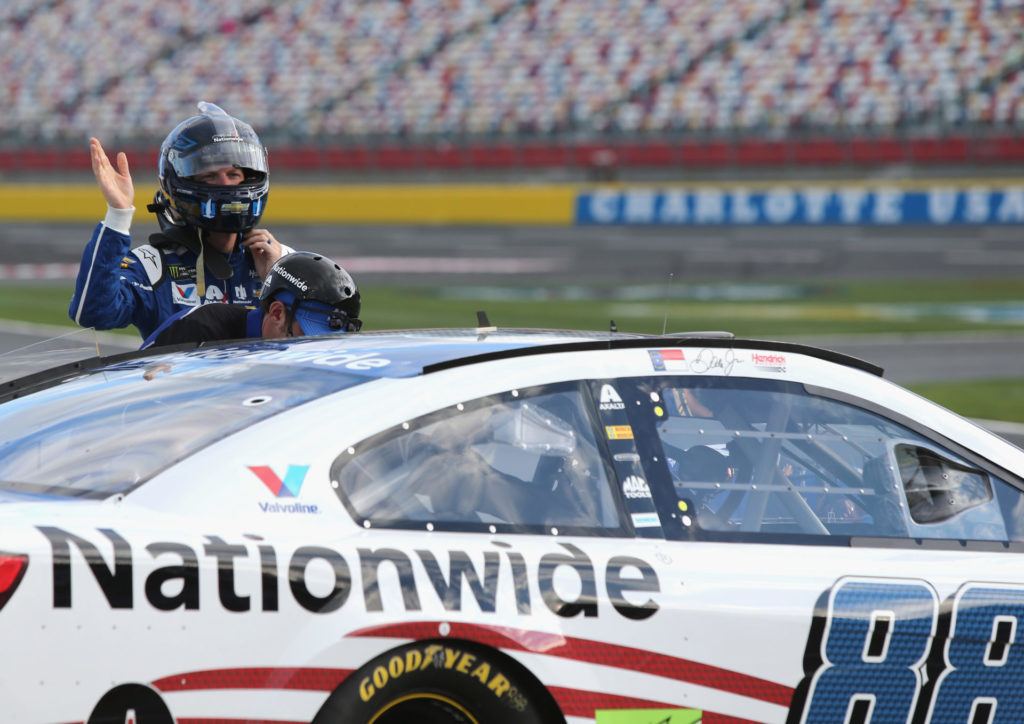
And it turned out to be at this track you were visiting for the show, the Metrolina Speedway in Charlotte
There’s a couple different dirt tracks that were around at that time, and I assumed all these years that it was at Concord, not Metrolina. I thought Metrolina came in a little bit later and was a big deal in the late ’70s, but apparently my grandfather raced there quite a bit. It was fun to learn a lot of that stuff for the first time.
Aside from the family connections, what made you want to look into the history of these “ghost tracks”?
I’ve always had this, I don’t know if weird is the right word for it, but I’ve always had this sort of—let me turn this off, my daughter was watching Frozen before I put her down for her nap, it’s getting a little bit loud—I always had this weird interest in the abandoned. I remember when I was younger and they were looking for the Titanic. And when they found it, and we were seeing it for the first time, it was so spooky and weird and really, really romantic. Then I started following these people who go to photograph abandoned theme parks and anything in the world that’s sort of left to the elements. And I started thinking about racetracks, and I made this map on Google Maps, looking up tracks that had closed, and I would zoom in and look for any imprint of the track in the ground. It was just like trying to find a ship at the bottom of the sea. And then this other guy that I’d become friends with unknowingly was doing the exact same thing at the same time. And so when we came together and said, “Hey, we should do a show about this,” we joined our maps together, and there’s now like 2,000 tracks on our maps.
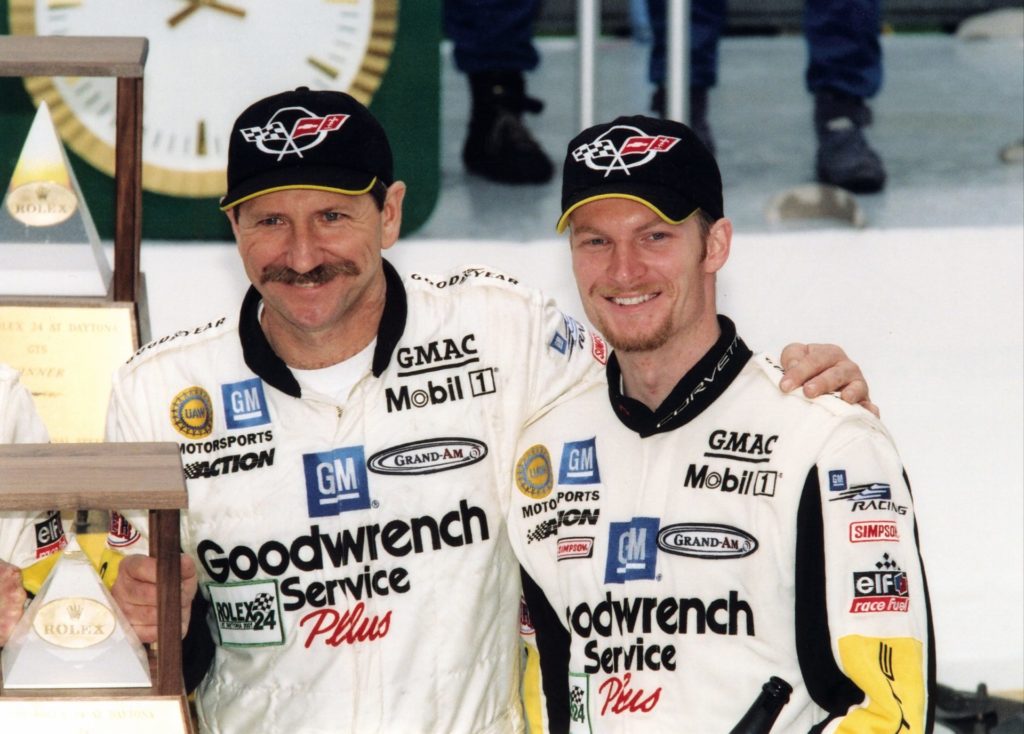
I’d like to switch gears for a moment and ask you about some more recent events. You’ve expressed support for peaceful protestors, and you had Bubba Wallace, currently the only Black driver in NASCAR, on your podcast to talk about race in America and the sport. Do you feel like the sport is changing for the better?
I’ve been so pleased with what I’ve seen. Obviously, Bubba’s done an amazing job, and I’m so thankful for him and how he’s taken his opportunity to make some real change in our sport. And there’s another element that’s different, and that’s the drivers—their voices. They’re all sort of congregating to either support Bubba or have their own message. They’re being asked about it in the media and answering with heart and honesty.
Where in the past they would’ve been hesitant to speak.
That, and I don’t know that they would even have been asked about some of these issues going on in the country, outside of the NASCAR bubble. And the last thing that is so critical is that NASCAR has backed the message and backed Bubba. Bubba came out and said to ban the Confederate flag, and NASCAR made a ban. I am so glad that they are competent enough to make a stand, form a message, and stick to it. It’s a really cool thing to see.
For much of your career, you were the only driver on the circuit who publicly spoke out against the Confederate flag.
I just want people to come to the racetrack and feel comfortable being there. I can’t imagine what it must feel like if you’re a fan and want to be at the racetrack, and you don’t feel welcome there. And I know people that are fans of the sport, Black fans, that have to ignore [the flag] just to be able to follow along and pull for their favorite drivers. It’s unfortunate, and hopefully no longer a problem.
Do you think NASCAR fans may be more open-minded than people assume?
I think that’s for sure possible. The people that are comfortable with the message [of equality] probably aren’t gonna make a lot of noise. They’re gonna go, “That works for me. I’ll see you at the racetrack.” The noise, as with anything in life, comes from the negative side. I always thought that one boo can drown out 10 cheers. Being introduced before the race, man, you’d always hear that one guy down by the fence booing you or shooting you the bird or whatever, and he would drown out the people cheering you. It’s the same thing on social media. You can easily let that one negative comment stew on you all day, whereas you’re totally overlooking hundreds of positive comments. There’s a lot of people that probably support these changes, and they’re just not gonna be as loud as the people that disagree.
Up next: Jason Segel Gets Serious in ‘Dispatches from Elsewhere’
